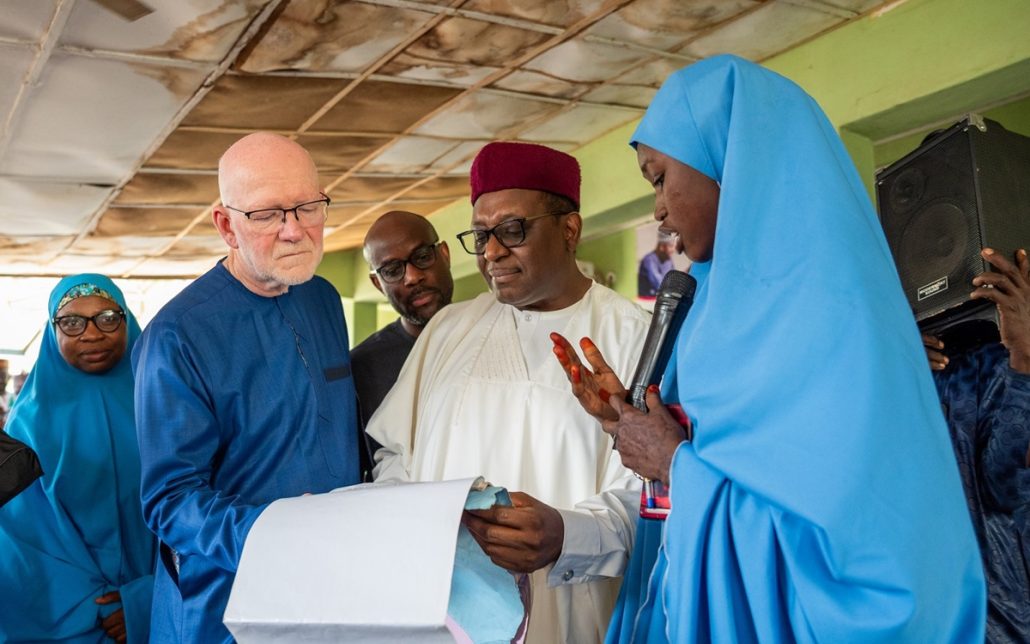
Aishatu Abbas, right, a Mama-to-Mama women’s group member, speaks to staff members, foundation employees, and Ali Pate, the Minister of Health and Social Welfare of Nigeria, in Gombe State, Nigeria.* ©Gates Archive/Adeokun Adesegun
Global health efforts have saved millions of lives over the past few decades. But now, those gains are under threat as funding becomes harder to secure. One key organisation behind this progress is Gavi, the Vaccine Alliance—a global group that helps poor countries get vaccines to protect children from deadly but preventable diseases.
Here’s a simple breakdown of what Gavi is, what it does, and why it matters now more than ever.
What is Gavi?
Gavi is a group made up of different partners—governments, organisations like the World Health Organization (WHO) and UNICEF, vaccine makers, donors like the Gates Foundation, and civil society groups. Their shared goal is to ensure every child—no matter where they are born—gets protection from dangerous diseases.
Why Gavi Matters: A Personal Story
Over 30 years ago, in Togo (a small country in West Africa), outbreaks of meningitis were so bad that entire communities put up roadblocks to stop the disease from spreading. Meningitis can cause death, deafness, or brain damage, especially in children.
Back then, people in Togo feared a disease that had already become rare in richer countries like the United States. The reason for the difference? Vaccines—which were too expensive for many poor countries. Gavi was created to solve this problem.
How Gavi Helps
For the past 25 years, Gavi has been helping low-income countries get affordable vaccines. Here’s how it works:
Countries tell Gavi which vaccines they need.
Gavi helps pay for vaccines and provides technical support.
It helps with logistics—like making sure vaccines stay cold, even in remote areas.
Gavi also works with humanitarian groups in conflict zones to reach children in crisis.
One of Gavi’s most important strategies is buying vaccines in large amounts. This lowers the price for poor countries. Thanks to this, the cost of common childhood vaccines has dropped by more than 50% since 2001.
A Big Breakthrough: MenAfriVac
In 2010, Gavi helped develop MenAfriVac®, a vaccine made especially for Africa to stop meningitis A, the most dangerous form of the disease in the region.
It cost only 60 cents per dose.
Burkina Faso was the first country to use it, vaccinating 11 million people in just 10 days.
Within months, meningitis A nearly disappeared from the country.
In 10 years, over 360 million people in Africa were vaccinated, and the disease dropped by 99%.
Gavi’s Success So Far
Since it started:
Gavi has helped run 637 vaccination campaigns.
Global child deaths have dropped from 9.9 million to 4.9 million.
19 countries (including Indonesia) that once relied on Gavi now pay for their vaccines themselves—and some even donate to help others.
In 2023, every country that works with Gavi paid its share of vaccine costs, showing how much they value the program.
The Problem Now: Falling Funds
Some donor countries are cutting back on how much money they give to Gavi. This could undo years of hard work. But investing in Gavi brings major returns: for every $1 invested, the benefits to partner countries are worth $54—helping both health and the economy.
Why It Matters
In 2014, when one vaccine recipient returned to Togo, they saw thousands of people waiting patiently under the hot sun to get vaccinated. That moment was a powerful reminder of how important vaccines are—and how much people value their protection.
But Gavi can’t continue its work without strong global support. If we stop funding immunisation programs now, millions of children may lose access to vaccines.
Final Note
Gavi isn’t just about shots—it’s about giving every child a chance at life. With continued investment and shared responsibility, we can keep protecting children around the world from deadly diseases—and build a healthier future for all.